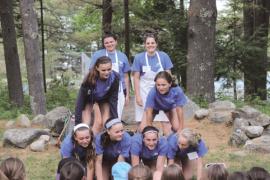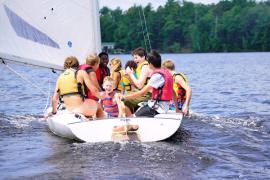Congratulations! You have just taken on one of the most rewarding jobs there are! Supervising camp activities or taking care of other people’s children is typically a very different kind of job than most. Success in the unique environment of camp — including making it through the season to the end of your contract — requires staff to ensure they are mentally, physically, and emotionally “in it,” ready to give fully (and often selflessly) of themselves in mind, body, heart, and spirit.
So here are some tips to help you get in it — and stay in it — all the way to job success and satisfaction!
Read, Read, Read
Read the information sent prior to camp and everything provided during staff training. Yes, read ALL of it. We want you to be successful in your job and did not write this for our own benefit — it’s for yours. The more you know, the more comfortable you are going to feel. Complete any online training provided and any reading suggested. Read your camp’s website. Watch your camp’s online videos. During camp, know where your staff handbook is and reference it when you have a question or a problem — chances are the answer is in there.
Understand Your Camp’s Policies
You are going to be held to these standards — know them so you can abide by them. Very specifically, pay attention to those policies which may govern your day-to-day activities, such as:
- Alcohol possession, consumption, and return-to-work conduct
- Tobacco use
- Dress code and personal appearance
- Romantic interactions between staff
- Use of electronics at camp, such as cell phones, tablets, etc.
- Personal conduct on site, such as curfew, restrictions to departing camp, etc.
Understand Your Job
Remember, this is a job (including if you are an intern or volunteer). It is always your responsibility to make sure you have a clear understanding of the expectations — for personal conduct, hours of work, taking care of campers, specific work tasks, operating procedures, safety standards, etc. If at any time you don’t know, ask for clarification, information, or additional training as needed.
Stay Focused During Staff Training
The whole point of staff training is to help you be awesome at your job. And who doesn’t want to be awesome? To get the most out of it, participate in staff training like it’s the most important class in your major: read, research, take notes, ask questions, and participate fully. Once the campers are at camp, you are not going to be able to go back to pick up the gems you missed, so gather the knowledge you can now. Paying attention to the cute counselor at the other table can wait.
Cultural Preparedness
Your cultural competence — understanding of the campers with whom you will be working and the community in which you will be working — is really important. A big part of your success will be determined by your ability to gain an understanding of who they are, where they come from, what they and their families value, and what they expect from the camp experience. This is particularly important for staff coming from financial, racial, ethnic, religious, or cultural backgrounds that are different from the campers.
Some things to think about:
- What is acceptable language (and gestures) to be used with and around campers? Swearing around kids is not acceptable, but what about the use of slang or urban acronyms?
- Do you know what topics are off-limits for discussion with or around campers? The values of the campers/families may be very different from yours. What you talk about at home, or with your peer group, might not be okay at camp.
- Dress code and appearance. Your personal style at home may not be what is expected, or even acceptable, at the camp.
- Are you allowed to play music around the campers? What about movies or video clips? Again, what you enjoy might not be acceptable for the kids’ eyes and ears.
- What activities will you do to help campers assimilate to camp? With each other?
For staff living with campers, make sure you understand any “cabin life” needs they may have and how you will accommodate them — such as for modesty and/or privacy while dressing/undressing (which can be challenging in a group-living situation), practice of daily religious rituals, or providing campers with an appropriate amount of time for personal grooming. Recognize that personal appearance may be important to some campers in a manner very different from that to which you are accustomed.
Camp Community
Whenever anyone joins a new group of people, he or she enters a new community. Successful experience requires an attitude of cooperation and an acceptance of both social and personal responsibility. You are all in this together. Expect to do your part in community life to keep facilities clean, treat property with care, and practice behaviors that are respectful to others. Your co-workers (and camp administration) are going to have little tolerance for behaviors that undermine the sense of community. There is no room for any conduct that is disrespectful to others, undermines the relationships between staff (gossiping, bullying, or cliques), or that contaminates the performance of others.
Physical Preparedness
As most camps include at least some type of physical activity, you need to be in the right kind of physical condition to meet the demands of the job. Going from doing nothing but playing video games in air conditioning to the daily pace of camp can be a physical shock, so it’s important to be active prior to arrival at camp. This is especially critical for staff working in active settings, adventure programs, sports camps, or as lifeguards. Acclimating to the heat, humidity, and outdoor conditions where the camp is located is also important. Getting used to being outside in the heat of summer prior to camp will help you acclimate faster and reduce your risk of illness.
Staying healthy during camp is also crucial. Again, for staff working in adventure programs, sports camps, or as lifeguards, you must maintain the appropriate level of fitness to do your job. Maintaining healthy eating habits (i.e. don’t live on ice cream or nachos from the snack shack) and staying hydrated by drinking plenty of water is important for all staff.
Medical and Psychological Preparedness
All pre-existing medical and psychological conditions should be under control prior to heading to camp. Staff who are unable to meet the demands of the job for medical or psychological reasons, or who repeatedly require medical attention from the camp, take resources to provide care and often require additional staffing to cover their work. Additionally, they create unneeded drama in the camp community. In some cases, depending on job duties and/or access to emergency care in a remote location, you may be putting yourself or others in danger. If your medical or psychological issues may impact your ability to do your job, it is critical that you inform your employer.
Medications
Working at camp is not the time to take a medication holiday — even if you used to do this as a kid during the summer. The social, physical, emotional, and mental demands of working at camp can be more intense than school or other types of jobs. This is specifically critical if the medication impacts your ability to (physically, mentally, or emotionally) perform the duties of your job, including such things as paying attention, dealing with anxiety, or managing a mood disorder. Come to camp prepared to stay on your medications.
- Bring enough medication for the duration of the employment season.
- Be prepared. If you have occasional issues with asthma, allergies, etc., be sure you have those medications with you, just in case.
- Bring whatever medications you typically take for things like pain, colds, and PMS. Don’t expect the camp’s health center to be your personal dispensary, or to carry your favorite brands.
Sleep More
To win it, you have to have the stamina to stay in it for the duration of the season. As much fun as the staff social scene can be, it’s necessary to maintain a healthy balance between work time, down time, and play time. Go to bed at night — even if it’s before staff curfew. As permitted with duty schedules, try to go to bed when your campers go to bed and sleep during rest periods whenever possible. Sleep during your time off. Sleep on your days off. While it may seem fun for the first week or so of camp, no one can sustain burning the candle at both ends for the entire season — you will burn out. Tired staff are not good staff, and you won’t be able to fully tune in to the campers. From decision making to how you react to and interact with campers and co-workers, being sleep deprived will impact your ability to do your job.
Party Less
The social aspects of staff life can be very appealing — and really easy to overdo. Along with getting enough sleep, it’s important to keep the partying under control. You won’t be able to bring your best self if you are exhausted or hung over. Further, the consequences of not being 100 percent on the job can literally become a life or death issue for the participants; don’t do something dumb that jeopardizes kids’ safety or the reputation of the camp — or that may haunt you for the rest of your life. Also remember that even though camp may appear to be a little utopian commune, the laws regarding alcohol and drug use still apply — including on private camp property. While each camp has a different approach to staff use of alcohol, etc., all need to manage risks and will have conduct and performance expectations. If your social activities are impacting your ability to perform your job duties, odds are you won’t have those duties for long. No responsible camp is going to tolerate a staff member who is drunk, high, or hung over while caring for other people’s children.
Personal Well Being
You are going to be taking care of the needs of others, so you must keep yourself pulled together. Everything from the long hours and the ongoing noisy din of the dining hall to the heat, camper interactions, and the constant need to be “on” can take a toll. Everyone needs time to decompress. Be intentional in taking your time off, and make sure to take time away from the camp, campers, and/or your co-workers. And not just so you can do your laundry. Sleep, read, do something you enjoy, treat yourself to a meal or your favorite ice cream — whatever you like to do to recharge.
Remember, Camp Is for the Campers
It’s easy for staff to get caught up in the fun and games of camp and forget that the program experience is not actually for them. Being in it to win it means you are there for the benefit of the campers. While camp is about transforming the lives of the participants, there is a difference between how this transformation applies to campers and how it applies to employees. At the end of the day, working at camp is not intended for your personal recreation or as a path to personal problem solving; it is a job. As such, your employer is going to expect you to function at the appropriate levels — including cooperation and meeting the challenges of working in a group setting.
Be Aware of Regression
One of the potential side effects of working, playing, and living with children 24/7 is that some staff may start acting like their campers. Staff who regress to more immature behaviors may demonstrate inappropriate decision making or lose their ability to discern between behaviors tolerated from campers and those tolerated from staff. Be mindful of why you are at camp (and nudge your co-workers who are acting like ten-year-olds back into adult behaviors).
Ask for Help
Anytime you don’t understand something, need clarification — or even if something doesn’t feel quite right — ask for help. This is especially important when you are unsure of the appropriate action or are unable to deal with a particular camper, behavior problem, or situation. Seeking help is not a sign of defeat or inadequacy; your camp administrators would much rather take the time to answer your questions and provide guidance (and even additional training) than have to deal with the results of poor decision making by staff or having to fire someone for doing something they should not have.
Photo courtesy of Asphalt Green Summer Day Camp, New York, New York.
Diane Tyrrell, CCD, is the director at Camp Motorsport/Chef Camp in Clover, Virginia. She can be reached at [email protected].





